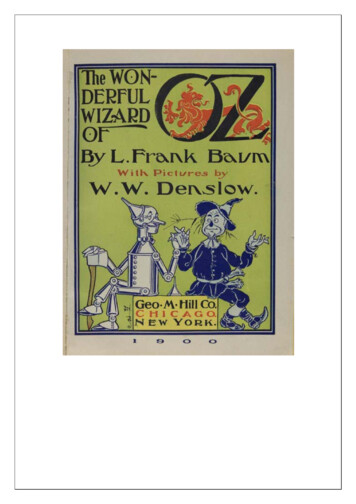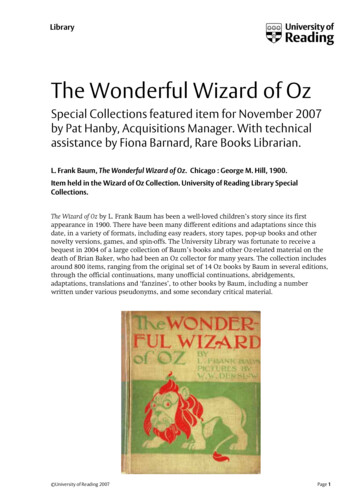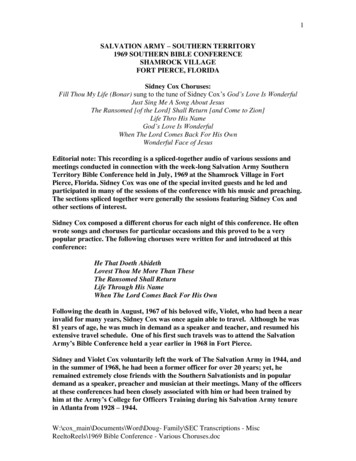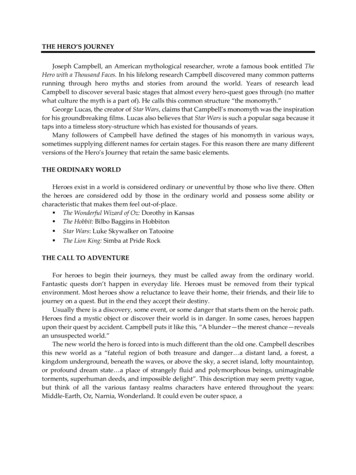
Transcription
THE WONDERFUL WIZARD OF OZBYL. FRANK BAUMILLUSTRATED BY W. W. DENSLOW1900
The Wonderful Wizard Of Oz By L. Frank Baum.This edition was created and published by Global Grey 2015. GlobalGrey 2015Get more free eBooks at:www.globalgrey.co.uk
CONTENTSIntroductionChapter 1. The CycloneChapter 2. The Council With The MunchkinsChapter 3. How Dorothy Saved The ScarecrowChapter 4. The Road Through The ForestChapter 5. The Rescue Of The Tin WoodmanChapter 6. The Cowardly LionChapter 7. The Journey To The Great OzChapter 8. The Deadly Poppy FieldChapter 9. The Queen Of The Field MiceChapter 10. The Guardian Of The GateChapter 11. The Wonderful Emerald City Of OzChapter 12. The Search For The Wicked WitchChapter 13. The RescueChapter 14. The Winged MonkeysChapter 15. The Discovery Of Oz, The TerribleChapter 16. The Magic Art Of The Great HumbugChapter 17. How The Balloon Was LaunchedChapter 18. Away To The SouthChapter 19. Attacked By The Fighting TreesChapter 20. The Dainty China CountryChapter 21. The Lion Becomes The King Of BeastsChapter 22. The Country Of The QuadlingsChapter 23. The Good Witch Grants Dorothy's WishChapter 24. Home Again
1I NTRODUCTIONFolk lore, legends, myths and fairy tales have followed childhood through the ages, for everyhealthy youngster has a wholesome and instinctive love for stories fantastic, marvelous andmanifestly unreal. The winged fairies of Grimm and Andersen have brought more happiness tochildish hearts than all other human creations.Yet the old–time fairy tale, having served for generations, may now be classed as "historical" inthe children's library; for the time has come for a series of newer "wonder tales" in which thestereotyped genie, dwarf and fairy are eliminated, together with all the horrible and blood–curdling incident devised by their authors to point a fearsome moral to each tale. Moderneducation includes morality; therefore the modern child seeks only entertainment in itswonder–tales and gladly dispenses with all disagreeable incident.Having this thought in mind, the story of "The Wonderful Wizard of Oz" was written solely topleasure children of today. It aspires to being a modernized fairy tale, in which the wondermentand joy are retained and the heart–aches and nightmares are left out.L. FRANK BAUM.CHICAGO, APRIL, 1900.
2C HAPTER 1. T HE C YCLONEDorothy lived in the midst of the great Kansas prairies, with Uncle Henry, who was a farmer, andAunt Em, who was the farmer's wife. Their house was small, for the lumber to build it had to becarried by wagon many miles. There were four walls, a floor and a roof, which made one room;and this room contained a rusty looking cooking stove, a cupboard for the dishes, a table, threeor four chairs, and the beds. Uncle Henry and Aunt Em had a big bed in one corner, and Dorothya little bed in another corner. There was no garret at all, and no cellar—except a small hole, dugin the ground, called a cyclone cellar, where the family could go in case one of those greatwhirlwinds arose, mighty enough to crush any building in its path. It was reached by a trap–door in the middle of the floor, from which a ladder led down into the small, dark hole.When Dorothy stood in the doorway and looked around, she could see nothing but the greatgray prairie on every side. Not a tree nor a house broke the broad sweep of flat country thatreached the edge of the sky in all directions. The sun had baked the plowed land into a graymass, with little cracks running through it. Even the grass was not green, for the sun had burnedthe tops of the long blades until they were the same gray color to be seen everywhere. Once thehouse had been painted, but the sun blistered the paint and the rains washed it away, and nowthe house was as dull and gray as everything else.When Aunt Em came there to live she was a young, pretty wife. The sun and wind had changedher, too. They had taken the sparkle from her eyes and left them a sober gray; they had takenthe red from her cheeks and lips, and they were gray also. She was thin and gaunt, and neversmiled, now. When Dorothy, who was an orphan, first came to her, Aunt Em had been so startledby the child's laughter that she would scream and press her hand upon her heart wheneverDorothy's merry voice reached her ears; and she still looked at the little girl with wonder thatshe could find anything to laugh at.Uncle Henry never laughed. He worked hard from morning till night and did not know what joywas. He was gray also, from his long beard to his rough boots, and he looked stern and solemn,and rarely spoke.It was Toto that made Dorothy laugh, and saved her from growing as gray as her othersurroundings. Toto was not gray; he was a little black dog, with long, silky hair and small blackeyes that twinkled merrily on either side of his funny, wee nose. Toto played all day long, andDorothy played with him, and loved him dearly.
3To–day, however, they were not playing. Uncle Henry sat upon the door–step and lookedanxiously at the sky, which was even grayer than usual. Dorothy stood in the door with Toto inher arms, and looked at the sky too. Aunt Em was washing the dishes.From the far north they heard a low wail of the wind, and Uncle Henry and Dorothy could seewhere the long grass bowed in waves before the coming storm. There now came a sharpwhistling in the air from the south, and as they turned their eyes that way they saw ripples inthe grass coming from that direction also.Suddenly Uncle Henry stood up."There's a cyclone coming, Em," he called to his wife; "I'll go look after the stock." Then he rantoward the sheds where the cows and horses were kept.Aunt Em dropped her work and came to the door. One glance told her of the danger close athand."Quick, Dorothy!" she screamed; "run for the cellar!"Toto jumped out of Dorothy's arms and hid under the bed, and the girl started to get him. AuntEm, badly frightened, threw open the trap–door in the floor and climbed down the ladder intothe small, dark hole. Dorothy caught Toto at last, and started to follow her aunt. When she washalf way across the room there came a great shriek from the wind, and the house shook so hardthat she lost her footing and sat down suddenly upon the floor.A strange thing then happened.
4The house whirled around two or three times and rose slowly through the air. Dorothy felt as ifshe were going up in a balloon.The north and south winds met where the house stood, and made it the exact center of thecyclone. In the middle of a cyclone the air is generally still, but the great pressure of the wind onevery side of the house raised it up higher and higher, until it was at the very top of the cyclone;and there it remained and was carried miles and miles away as easily as you could carry afeather.It was very dark, and the wind howled horribly around her, but Dorothy found she was ridingquite easily. After the first few whirls around, and one other time when the house tipped badly,she felt as if she were being rocked gently, like a baby in a cradle.Toto did not like it. He ran about the room, now here, now there, barking loudly; but Dorothy satquite still on the floor and waited to see what would happen.Once Toto got too near the open trap–door, and fell in; and at first the little girl thought she hadlost him. But soon she saw one of his ears sticking up through the hole, for the strong pressureof the air was keeping him up so that he could not fall. She crept to the hole, caught Toto by theear, and dragged him into the room again; afterward closing the trap–door so that no moreaccidents could happen."She caught Toto by the ear."
5Hour after hour passed away, and slowly Dorothy got over her fright; but she felt quite lonely,and the wind shrieked so loudly all about her that she nearly became deaf. At first she hadwondered if she would be dashed to pieces when the house fell again; but as the hours passedand nothing terrible happened, she stopped worrying and resolved to wait calmly and see whatthe future would bring. At last she crawled over the swaying floor to her bed, and lay downupon it; and Toto followed and lay down beside her.In spite of the swaying of the house and the wailing of the wind, Dorothy soon closed her eyesand fell fast asleep.
6C HAPTER 2. T HE C OUNCIL W ITH T HE M UNCHKINSShe was awakened by a shock, so sudden and severe that if Dorothy had not been lying on thesoft bed she might have been hurt. As it was, the jar made her catch her breath and wonderwhat had happened; and Toto put his cold little nose into her face and whined dismally. Dorothysat up and noticed that the house was not moving; nor was it dark, for the bright sunshine camein at the window, flooding the little room. She sprang from her bed and with Toto at her heelsran and opened the door.The little girl gave a cry of amazement and looked about her, her eyes growing bigger and biggerat the wonderful sights she saw.The cyclone had set the house down, very gently—for a cyclone—in the midst of a country ofmarvelous beauty. There were lovely patches of green sward all about, with stately treesbearing rich and luscious fruits. Banks of gorgeous flowers were on every hand, and birds withrare and brilliant plumage sang and fluttered in the trees and bushes. A little way off was a smallbrook, rushing and sparkling along between green banks, and murmuring in a voice verygrateful to a little girl who had lived so long on the dry, gray prairies.While she stood looking eagerly at the strange and beautiful sights, she noticed coming towardher a group of the queerest people she had ever seen. They were not as big as the grown folk shehad always been used to; but neither were they very small. In fact, they seemed about as tall asDorothy, who was a well–grown child for her age, although they were, so far as looks go, manyyears older.
7Three were men and one a woman, and all were oddly dressed. They wore round hats that roseto a small point a foot above their heads, with little bells around the brims that tinkled sweetlyas they moved. The hats of the men were blue; the little woman's hat was white, and she wore awhite gown that hung in plaits from her shoulders; over it were sprinkled little stars thatglistened in the sun like diamonds. The men were dressed in blue, of the same shade as theirhats, and wore well polished boots with a deep roll of blue at the tops. The men, Dorothythought, were about as old as Uncle Henry, for two of them had beards. But the little woman wasdoubtless much older: her face was covered with wrinkles, her hair was nearly white, and shewalked rather stiffly.When these people drew near the house where Dorothy was standing in the doorway, theypaused and whispered among themselves, as if afraid to come farther. But the little old womanwalked up to Dorothy, made a low bow and said, in a sweet voice,"You are welcome, most noble Sorceress, to the land of the Munchkins. We are so grateful to youfor having killed the wicked Witch of the East, and for setting our people free from bondage.""I am the Witch of the North."
8Dorothy listened to this speech with wonder. What could the little woman possibly mean bycalling her a sorceress, and saying she had killed the wicked Witch of the East? Dorothy was aninnocent, harmless little girl, who had been carried by a cyclone many miles from home; and shehad never killed anything in all her life.But the little woman evidently expected her to answer; so Dorothy said, with hesitation,"You are very kind; but there must be some mistake. I have not killed anything.""Your house did, anyway," replied the little old woman, with a laugh; "and that is the same thing.See!" she continued, pointing to the corner of the house; "there are her two toes, still stickingout from under a block of wood."Dorothy looked, and gave a little cry of fright. There, indeed, just under the corner of the greatbeam the house rested on, two feet were sticking out, shod in silver shoes with pointed toes."Oh, dear! oh, dear!" cried Dorothy, clasping her hands together in dismay; "the house musthave fallen on her. What ever shall we do?""There is nothing to be done," said the little woman, calmly."But who was she?" asked Dorothy.
9"She was the wicked Witch of the East, as I said," answered the little woman. "She has held allthe Munchkins in bondage for many years, making them slave for her night and day. Now theyare all set free, and are grateful to you for the favour.""Who are the Munchkins?" enquired Dorothy."They are the people who live in this land of the East, where the wicked Witch ruled.""Are you a Munchkin?" asked Dorothy."No; but I am their friend, although I live in the land of the North. When they saw the Witch ofthe East was dead the Munchkins sent a swift messenger to me, and I came at once. I am theWitch of the North.""Oh, gracious!" cried Dorothy; "are you a real witch?""Yes, indeed;" answered the little woman. "But I am a good witch, and the people love me. I amnot as powerful as the wicked Witch was who ruled here, or I should have set the people freemyself.""But I thought all witches were wicked," said the girl, who was half frightened at facing a realwitch."Oh, no; that is a great mistake. There were only four witches in all the Land of Oz, and two ofthem, those who live in the North and the South, are good witches. I know this is true, for I amone of them myself, and cannot be mistaken. Those who dwelt in the East and the West were,indeed, wicked witches; but now that you have killed one of them, there is but one wicked Witchin all the Land of Oz—the one who lives in the West.""But," said Dorothy, after a moment's thought, "Aunt Em has told me that the witches were alldead—years and years ago.""Who is Aunt Em?" inquired the little old woman."She is my aunt who lives in Kansas, where I came from."The Witch of the North seemed to think for a time, with her head bowed and her eyes upon theground. Then she looked up and said,"I do not know where Kansas is, for I have never heard that country mentioned before. But tellme, is it a civilized country?""Oh, yes;" replied Dorothy."Then that accounts for it. In the civilized countries I believe there are no witches left; norwizards, nor sorceresses, nor magicians. But, you see, the Land of Oz has never been civilized,for we are cut off from all the rest of the world. Therefore we still have witches and wizardsamongst us.""Who are the Wizards?" asked Dorothy.
10"Oz himself is the Great Wizard," answered the Witch, sinking her voice to a whisper. "He ismore powerful than all the rest of us together. He lives in the City of Emeralds."Dorothy was going to ask another question, but just then the Munchkins, who had been standingsilently by, gave a loud shout and pointed to the corner of the house where the Wicked Witchhad been lying."What is it?" asked the little old woman; and looked, and began to laugh. The feet of the deadWitch had disappeared entirely and nothing was left but the silver shoes."She was so old," explained the Witch of the North, "that she dried up quickly in the sun. That isthe end of her. But the silver shoes are yours, and you shall have them to wear." She reacheddown and picked up the shoes, and after shaking the dust out of them handed them to Dorothy."The Witch of the East was proud of those silver shoes," said one of the Munchkins; "and there issome charm connected with them; but what it is we never knew."Dorothy carried the shoes into the house and placed them on the table. Then she came out againto the Munchkins and said,"I am anxious to get back to my Aunt and Uncle, for I am sure they will worry about me. Can youhelp me find my way?"The Munchkins and the Witch first looked at one another, and then at Dorothy, and then shooktheir heads.
11"At the East, not far from here," said one, "there is a great desert, and none could live to cross it.""It is the same at the South," said another, "for I have been there and seen it. The South is thecountry of the Quadlings.""I am told," said the third man, "that it is the same at the West. And that country, where theWinkies live, is ruled by the wicked Witch of the West, who would make you her slave if youpassed her way.""The North is my home," said the old lady, "and at its edge is the same great desert thatsurrounds this land of Oz. I'm afraid, my dear, you will have to live with us."Dorothy began to sob, at this, for she felt lonely among all these strange people. Her tearsseemed to grieve the kind–hearted Munchkins, for they immediately took out theirhandkerchiefs and began to weep also. As for the little old woman, she took off her cap andbalanced the point on the end of her nose, while she counted "one, two, three" in a solemn voice.At once the cap changed to a slate, on which was written in big, white chalk marks:"LET DOROTHY GO TO THE CITY OF EMERALDS."The little old woman took the slate from her nose, and, having read the words on it, asked,"Is your name Dorothy, my dear?""Yes," answered the child, looking up and drying her tears."Then you must go to the City of Emeralds. Perhaps Oz will help you.""Where is this City?" asked Dorothy."It is exactly in the center of the country, and is ruled by Oz, the Great Wizard I told you of.""Is he a good man?" enquired the girl, anxiously.
12"He is a good Wizard. Whether he is a man or not I cannot tell, for I have never seen him.""How can I get there?" asked Dorothy."You must walk. It is a long journey, through a country that is sometimes pleasant andsometimes dark and terrible. However, I will use all the magic arts I know of to keep you fromharm.""Won't you go with me?" pleaded the girl, who had begun to look upon the little old woman asher only friend."No, I cannot do that," she replied; "but I will give you my kiss, and no one will dare injure aperson who has been kissed by the Witch of the North."She came close to Dorothy and kissed her gently on the forehead. Where her lips touched thegirl they left a round, shining mark, as Dorothy found out soon after."The road to the City of Emeralds is paved with yellow brick," said the Witch; "so you cannotmiss it. When you get to Oz do not be afraid of him, but tell your story and ask him to help you.Good–bye, my dear."The three Munchkins bowed low to her and wished her a pleasant journey, after which theywalked away through the trees. The Witch gave Dorothy a friendly little nod, whirled around onher left heel three times, and straightway disappeared, much to the surprise of little Toto, whobarked after her loudly enough when she had gone, because he had been afraid even to growlwhile she stood by.
13But Dorothy, knowing her to be a witch, had expected her to disappear in just that way, and wasnot surprised in the least.
14C HAPTER 3. H OW D OROTHY S AVED T HE S CARECROWWhen Dorothy was left alone she began to feel hungry. So she went to the cupboard and cutherself some bread, which she spread with butter. She gave some to Toto, and taking a pail fromthe shelf she carried it down to the little brook and filled it with clear, sparkling water. Toto ranover to the trees and began to bark at the birds sitting there. Dorothy went to get him, and sawsuch delicious fruit hanging from the branches that she gathered some of it, finding it just whatshe wanted to help out her breakfast.Then she went back to the house, and having helped herself and Toto to a good drink of the cool,clear water, she set about making ready for the journey to the City of Emeralds.Dorothy had only one other dress, but that happened to be clean and was hanging on a pegbeside her bed. It was gingham, with checks of white and blue; and although the blue wassomewhat faded with many washings, it was still a pretty frock. The girl washed herselfcarefully, dressed herself in the clean gingham, and tied her pink sunbonnet on her head. Shetook a little basket and filled it with bread from the cupboard, laying a white cloth over the top.Then she looked down at her feet and noticed how old and worn her shoes were."They surely will never do for a long journey, Toto," she said. And Toto looked up into her facewith his little black eyes and wagged his tail to show he knew what she meant.At that moment Dorothy saw lying on the table the silver shoes that had belonged to the Witchof the East."I wonder if they will fit me," she said to Toto. "They would be just the thing to take a long walkin, for they could not wear out."She took off her old leather shoes and tried on the silver ones, which fitted her as well as if theyhad been made for her.Finally she picked up her basket."Come along, Toto," she said, "we will go to the Emerald City and ask the great Oz how to getback to Kansas again."She closed the door, locked it, and put the key carefully in the pocket of her dress. And so, withToto trotting along soberly behind her, she started on her journey.There were several roads near by, but it did not take her long to find the one paved with yellowbrick. Within a short time she was walking briskly toward the Emerald City, her silver shoestinkling merrily on the hard, yellow roadbed. The sun shone bright and the birds sang sweet andDorothy did not feel nearly as bad as you might think a little girl would who had been suddenlywhisked away from her own country and set down in the midst of a strange land.
15She was surprised, as she walked along, to see how pretty the country was about her. Therewere neat fences at the sides of the road, painted a dainty blue color, and beyond them werefields of grain and vegetables in abundance. Evidently the Munchkins were good farmers andable to raise large crops. Once in a while she would pass a house, and the people came out tolook at her and bow low as she went by; for everyone knew she had been the means ofdestroying the wicked witch and setting them free from bondage. The houses of the Munchkinswere odd looking dwellings, for each was round, with a big dome for a roof. All were paintedblue, for in this country of the East blue was the favorite color.Towards evening, when Dorothy was tired with her long walk and began to wonder where sheshould pass the night, she came to a house rather larger than the rest. On the green lawn beforeit many men and women were dancing. Five little fiddlers played as loudly as possible and thepeople were laughing and singing, while a big table near by was loaded with delicious fruits andnuts, pies and cakes, and many other good things to eat.The people greeted Dorothy kindly, and invited her to supper and to pass the night with them;for this was the home of one of the richest Munchkins in the land, and his friends were gatheredwith him to celebrate their freedom from the bondage of the wicked witch.Dorothy ate a hearty supper and was waited upon by the rich Munchkin himself, whose namewas Boq. Then she sat down upon a settee and watched the people dance.When Boq saw her silver shoes he said,
16"You must be a great sorceress.""Why?" asked the girl."Because you wear silver shoes and have killed the wicked witch. Besides, you have white inyour frock, and only witches and sorceresses wear white.""You must be a great sorceress.""My dress is blue and white checked," said Dorothy, smoothing out the wrinkles in it."It is kind of you to wear that," said Boq. "Blue is the color of the Munchkins, and white is thewitch color; so we know you are a friendly witch."
17Dorothy did not know what to say to this, for all the people seemed to think her a witch, and sheknew very well she was only an ordinary little girl who had come by the chance of a cyclone intoa strange land.When she had tired watching the dancing, Boq led her into the house, where he gave her a roomwith a pretty bed in it. The sheets were made of blue cloth, and Dorothy slept soundly in themtill morning, with Toto curled up on the blue rug beside her.She ate a hearty breakfast, and watched a wee Munchkin baby, who played with Toto and pulledhis tail and crowed and laughed in a way that greatly amused Dorothy. Toto was a fine curiosityto all the people, for they had never seen a dog before."How far is it to the Emerald City?" the girl asked."I do not know," answered Boq, gravely, "for I have never been there. It is better for people tokeep away from Oz, unless they have business with him. But it is a long way to the Emerald City,and it will take you many days. The country here is rich and pleasant, but you must pass throughrough and dangerous places before you reach the end of your journey."This worried Dorothy a little, but she knew that only the great Oz could help her get to Kansasagain, so she bravely resolved not to turn back.
18She bade her friends good–bye, and again started along the road of yellow brick. When she hadgone several miles she thought she would stop to rest, and so climbed to the top of the fencebeside the road and sat down. There was a great cornfield beyond the fence, and not far awayshe saw a Scarecrow, placed high on a pole to keep the birds from the ripe corn.Dorothy leaned her chin upon her hand and gazed thoughtfully at the Scarecrow. Its head was asmall sack stuffed with straw, with eyes, nose and mouth painted on it to represent a face. Anold, pointed blue hat, that had belonged to some Munchkin, was perched on this head, and therest of the figure was a blue suit of clothes, worn and faded, which had also been stuffed withstraw. On the feet were some old boots with blue tops, such as every man wore in this country,and the figure was raised above the stalks of corn by means of the pole stuck up its back."Dorothy gazed thoughtfully at the Scarecrow."While Dorothy was looking earnestly into the queer, painted face of the Scarecrow, she wassurprised to see one of the eyes slowly wink at her. She thought she must have been mistaken,
19at first, for none of the scarecrows in Kansas ever wink; but presently the figure nodded its headto her in a friendly way. Then she climbed down from the fence and walked up to it, while Totoran around the pole and barked."Good day," said the Scarecrow, in a rather husky voice."Did you speak?" asked the girl, in wonder."Certainly," answered the Scarecrow; "how do you do?""I'm pretty well, thank you," replied Dorothy, politely; "how do you do?""I'm not feeling well," said the Scarecrow, with a smile, "for it is very tedious being perched uphere night and day to scare away crows.""Can't you get down?" asked Dorothy."No, for this pole is stuck up my back. If you will please take away the pole I shall be greatlyobliged to you."Dorothy reached up both arms and lifted the figure off the pole; for, being stuffed with straw, itwas quite light."Thank you very much," said the Scarecrow, when he had been set down on the ground. "I feellike a new man."Dorothy was puzzled at this, for it sounded queer to hear a stuffed man speak, and to see himbow and walk along beside her."Who are you?" asked the Scarecrow, when he had stretched himself and yawned, "and whereare you going?""My name is Dorothy," said the girl, "and I am going to the Emerald City, to ask the great Oz tosend me back to Kansas.""Where is the Emerald City?" he enquired; "and who is Oz?""Why, don't you know?" she returned, in surprise."No, indeed; I don't know anything. You see, I am stuffed, so I have no brains at all," heanswered, sadly."Oh," said Dorothy; "I'm awfully sorry for you.""Do you think," he asked, "If I go to the Emerald City with you, that the great Oz would give mesome brains?""I cannot tell," she returned; "but you may come with me, if you like. If Oz will not give you anybrains you will be no worse off than you are now."
20"That is true," said the Scarecrow. "You see," he continued, confidentially, "I don't mind my legsand arms and body being stuffed, because I cannot get hurt. If anyone treads on my toes orsticks a pin into me, it doesn't matter, for I cant feel it. But I do not want people to call me a fool,and if my head stays stuffed with straw instead of with brains, as yours is, how am I ever toknow anything?""I understand how you feel," said the little girl, who was truly sorry for him. "If you will comewith me I'll ask Oz to do all he can for you.""Thank you," he answered, gratefully.They walked back to the road, Dorothy helped him over the fence, and they started along thepath of yellow brick for the Emerald City. Toto did not like this addition to the party, at first. Hesmelled around the stuffed man as if he suspected there might be a nest of rats in the straw, andhe often growled in an unfriendly way at the Scarecrow."Don't mind Toto," said Dorothy, to her new friend; "he never bites.""Oh, I'm not afraid," replied the Scarecrow, "he can't hurt the straw. Do let me carry that basketfor you. I shall not mind it, for I can't get tired. I'll tell you a secret," he continued, as he walkedalong; "there is only one thing in the world I am afraid of.""What is that?" asked Dorothy; "the Munchkin farmer who made you?""No," answered the Scarecrow; "it's a lighted match."
21C HAPTER 4. T HE R OAD T HROUGH T HE F ORESTAfter a few hours the road began to be rough, and the walking grew so difficult that theScarecrow often stumbled over the yellow brick, which were here very uneven. Sometimes,indeed, they were broken or missing altogether, leaving holes that Toto jumped across andDorothy walked around. As for the Scarecrow, having no brains he walked straight ahead, andso stepped into the holes and fell at full length on the hard bricks. It never hurt him, however,and Dorothy would pick him up and set him upon his feet again, while he joined her in laughingmerrily at his own mishap.The farms were not nearly so well cared for here as they were farther back. There were fewerhouses and fewer fruit trees, and the farther they went the more dismal and lonesome thecountry became.At noon they sat down by the roadside, near a little brook, and Dorothy opened her basket andgot out some bread. Sh
Chapter 1. The Cyclone Chapter 2. The Council With The Munchkins Chapter 3. How Dorothy Saved The Scarecrow Chapter 4. The Road Through The Forest Chapter 5. The Rescue Of The Tin Woodman Chapter 6. The Cowardly Lion Chapter 7. The Journey To The Great Oz Chapter 8. The Deadly Poppy Field C











